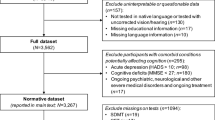Abstract
Long-term follow-up studies of individuals with galactosaemia have indicated that despite a strict galactose-free diet, cognitive functioning is often below average. This study was designed to examine the neuropsychological profile of individuals with galactosaemia in terms of IQ, memory, executive functioning, perceptual abilities and educational outcome. Twenty-eight people with classic galactosaemia and no comorbid neurological or psychiatric disorder took part. A battery of clinical neuropsychological tests was performed. Overall, findings were consistent with previous literature in showing galactosaemia to be linked to below-average functioning across a range of cognitive measures when mean scores were examined. Thus, the mean overall scores for verbal and performance IQ, memory, and executive functions were in the low average range. However, a range of ability was represented across individuals, with some achieving average or above scores and education to A level or above. Further work using longitudinal methodology is needed to address the issue of factors mediating any cognitive weaknesses and to establish the extent of any possible decline in functioning over time.
Similar content being viewed by others
Abbreviations
- GALT:
-
human galactose-1-phosphate uridyl transferase
- PET:
-
positron emission tomography
- IQ:
-
intellectual quotient
References
Antshel KM, Epstein IO, Waisbren E (2004) Cognitive strengths and weaknesses in children and adolescents homozygous for the galactosemia Q188R mutation: A descriptive study. Neuropsychol 18:658–644
Beutler E, Baluda M, Donnell G (1995) A new method for the detection of galactosaemia and its carrier state. J Lab Clin Med 64:646–658
Bhat M, Haase C, Lee P (2005) Social outcome in treated individuals with inherited metabolic disorders: UK study. J Inherit Metab Dis 28:825–830
Bosch AM (2006) Classical galactosaemia revisited. J Inherit Metab Dis 29:516–525
Bosch AM, Grootenhuis MA, Bakker HD et al (2004) Living with classical galactosemia: Health-related quality of life consequences. Pediatrics 113:5423–5428
Bosch AM, Ijlst L, Oostheim W et al (2005) Identification of novel mutations in classical galactosemia. Hum Mutat 25:502
Burgess PW, Shallice T (1997) The Hayling and Brixton Tests. Thames Valley Test Company, Bury St Edmunds
Dubroff JG, Ficicoglu C, Segal S et al (2008) FDG-PET findings in patients with galactosaemia. J Metab Dis 31:533–539
Fischler K, Koch R, Donnell GN et al (1980) Developmental aspects of galactosemia from infancy to childhood. Clin Pediatr 19:38–44
Gioia GA, Isquith PK, Guy SC et al (2000) Behavior rating of executive function. Psychological Assessment Resources, Lutz
Honeyman MM, Green A, Leonard JV (1993) Galactosemia: results of the british pediatric surveillance unit study, 1988–90. Arch Dis Child 69:339–341
Kaufmann FR, McBride-Chang C, Manis FR et al (1995) Cognitive functioning, neurologic status and brain imaging in classical galactosemia. Eur J Paediatr S2:S2–S5
Komrower G, Lee D (1970) Long-term follow up of galactosaemia. J Pediatr 102:75–77
Lo W, Packman S, Nash S et al (1984) Curious neurologic sequelae in galactosemia. Pediatrics 73:309–312
Manis FR, Cohn LB, McBride-Chang C et al (1997) A longitudinal study of classical galactosaemia, including a cohort treated with oral uridine. J Inherit Metab Dis 20:549–555
Nelson MD, Wolff JA, Cross CA et al (1992) Galactosemia: evaluation with MR imaging. Radiology 184:255–261
Potter NL, Lazarus JAC, Johnson JM et al (2008) Correlates of language impairment in children with galactosaemia. J Inherit Metab Dis 31:524–532
Ridel KR, Leslie ND, Gilbert DL (2005) An updated review of the long-term neurological effects of galactosemia. Pediatr Neurol 33:153–161
Rijsdijk FV, Vernon PA, Boomsma DI (1998) The genetic basis of the relation between speed of information processing and IQ. Behav Brain Res 95:77–84
Sattler JM (2001) Assessment of children: cognitive applications, 4th edn. JM Sattler, San Diego
Schweitzer S, Shin Y, Brodehl J (1993) Long-term outcome in 134 patients with galactosaemia. Eur J Pediatr 52:36–43
Schweitzer-Krantz S (2003) Early diagnosis of inherited metabolic disorders towards improving outcome: the controversial issue of galactosemia. Eur J Pediatr 162:S50–S53
Segal S, Berry G et al (2001) Disorders of galactose metabolism. In: Scriver CR, Beaudet AL, Sly WS (eds) The metabolic and molecular bases of inherited disease, 8th edn. McGraw-Hill, New York, pp 967–1000
Wagonner DD, Buist NRM, Donnell GN (1990) Long-term prognosis in galactosaemia: Results of a survey of 350 cases. J Inherit Met Dis 13:802–818
Warrington EK, James M (1991) Visual Object and Space Perception Battery. Thames Valley Test Company, Bury St Edmunds
Wechsler D (1997a) Wechsler Adult Intelligence Scale, 3rd edn. The Psychological Corporation, San Antonio
Wechsler D (1997b) Wechsler Memory Scales, 3rd edn. The Psychological Corporation, San Antonio
Wechsler D (1999) Wechsler Abbreviated Scale of Intelligence. The Psychological Corporation, San Antonio
Widhalm K, Miranda-da-Cruz B, de Sonneville LMJ (2002) Information processing characteristics and uridine treatment in children with classical galactosemia. Nutr Res 22:257–270
Author information
Authors and Affiliations
Corresponding author
Additional information
Communicated by: Gerard T. Berry
Competing interests: The authors declare that they have no competing interests.
Rights and permissions
About this article
Cite this article
Doyle, C.M., Channon, S., Orlowska, D. et al. The neuropsychological profile of galactosaemia. J Inherit Metab Dis 33, 603–609 (2010). https://doi.org/10.1007/s10545-010-9154-y
Received:
Revised:
Accepted:
Published:
Issue Date:
DOI: https://doi.org/10.1007/s10545-010-9154-y




